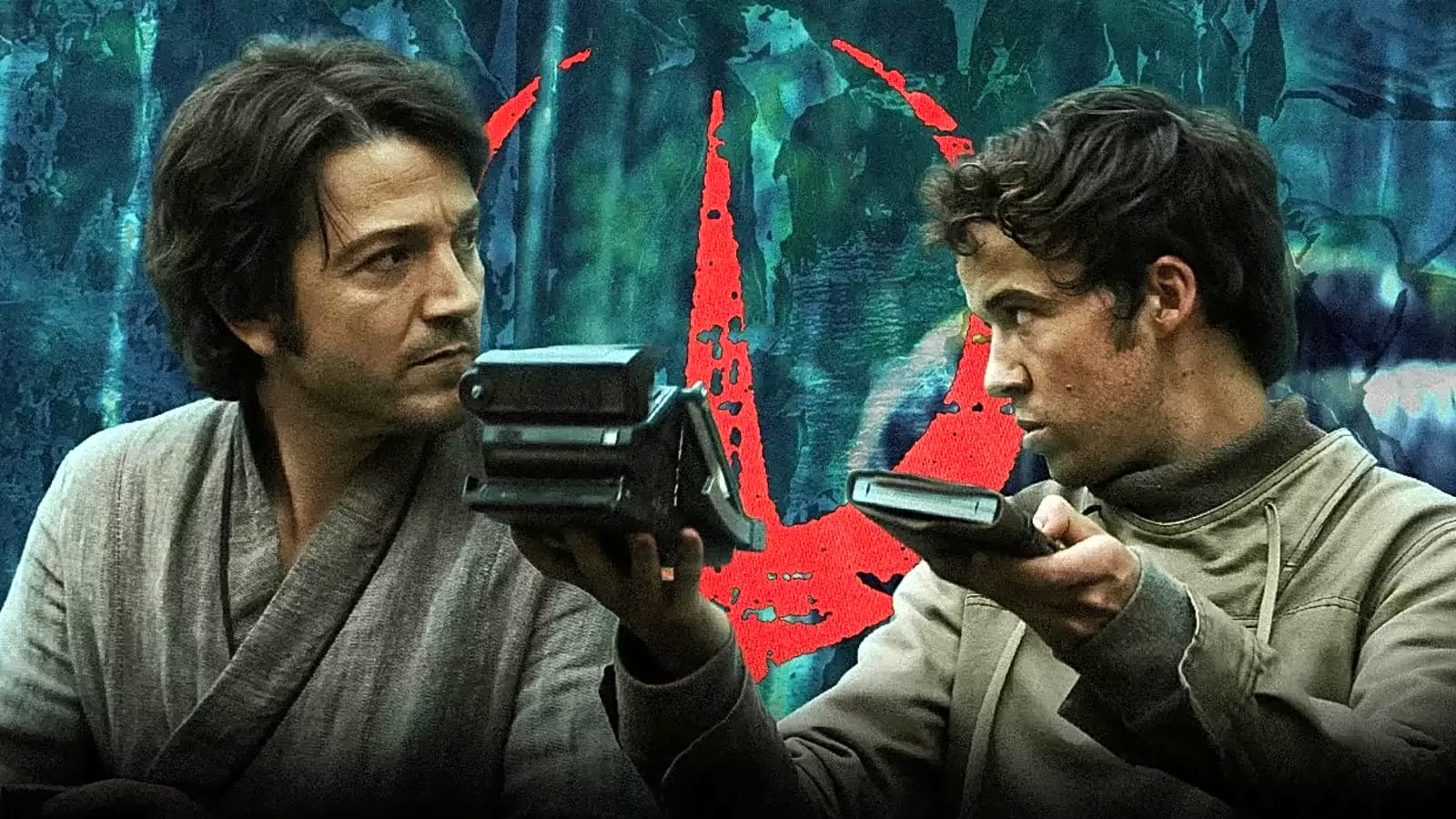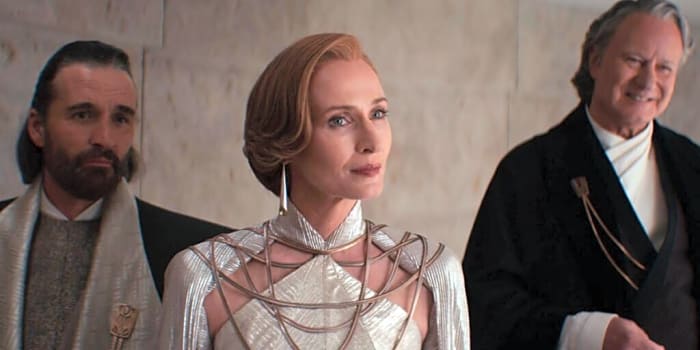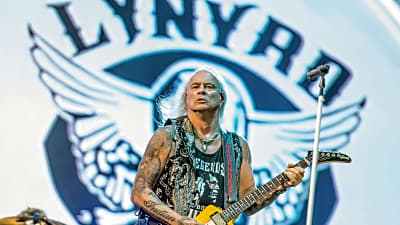
“Freedom is a pure idea. It occurs spontaneously and without instruction.” – Karis Nemik (Andor Season 1)
Empires hate Resistance.
Every burgeoning authoritarian government advances the notion that those who resist its authority are far outnumbered by those who would die to maintain it. The autocrat has, in most every case, coerced the populace into ceding portions of its freedoms in the interests of order and security, granting the regime that which it craves most, control.
With that control, authoritarian regimes commandeer the means of mass communication and choke off the sharing of ideas, save their state-approved propaganda. Media in hand, the fascistic dictator rewrites histories in their own image, eradicates cultures in the name of one-state orthodoxy, and cripples the very democratic process they once co-opted to attain his power. The effect is nothing short of psychological dominance. Even the most ardent rebels are worn down to the resignation of hopelessness, if not full-throated submission to the state’s ubiquitous authority. The regime would have its people believe that rebellion is unnatural, immoral, and futile. This is an illusion, of course, for man’s natural inclination is to be free.
“The Imperial need for control is so desperate because it is so unnatural. Tyranny requires constant effort. It breaks, it leaks. Authority is brittle. Oppression is the mask of fear. Remember that.” – Karis Nemik (Andor Season 1)
As academia and the press are brought under the thumb of fascism, art persists. While formal art institutions are not impervious to a dictator’s reach, art endures because it is the only truly democratic act there is. Anyone can make art, and art can be made anywhere. Art is our purest form of communication. The complexities of the human condition are brought down to their most elemental through artistic endeavor. Love. Death. Freedom. Art subverts. It inspires. It comforts and upsets. Every human being is an artist, and all art speaks to what it means to be human. Every piece of art created under the chokehold of fascism is an act of rebellion.
Star Wars Has Always Been About More Than Lightsabers and the Force

In the arena of fandom IP, artistic endeavor is usually secondary to commercial success. Utilizing tentpole properties for commentary on contemporary, real-world issues is a financial risk. Taking stances against political or ideological movements, even authoritarianism, threatens to alienate the sympathizers and hurt the bottom line. Further, during fascism, studios and the corporate conglomerates that own them must negotiate how their decisions invite retaliation from the state itself.
It’s because of the circumstances of this precise political moment that Andor, Disney’s prestige drama set in the Star Wars universe, is nothing short of a miracle. Andor is a meditation on colonialism, fascism, oppression, and, ultimately, a manifesto on freedom. In a half-century of Star Wars storytelling, the depiction of what it means to live under the boot of a fascist state has never been made more clear. Andor masterfully utilizes the bully pulpit of the largest commercial brand in the fandom arena to deliver its anti-fascist message to the largest audience possible.
In Andor, we are witness to conquered cultures with ancient customs now at their death knells. We see the incarcerated people of the Empire, living out their sentences, building the widgets that comprise the Death Star, and we reflect on our own sprawling Prison Industrial Complex. We are shown the economic, political, and sexual exploitation of undocumented migrants by state authorities. Andor demonstrates how fascism is fueled by propaganda, indoctrination, the banality of evil, and the appeasement of those unwilling to upset the comforts of their own lives. We see the sacrifices each rebel must make to undermine the Empire, regardless of race, creed, or caste. And for perhaps the first time in the history of Star Wars, we understand why they make them.
“The death of truth is the ultimate victory of evil. When truth leaves us, when we let it slip away, when it is ripped from our hands, we become vulnerable to the appetite of whatever monster screams the loudest.” – Mon Mothma (Andor Season 2)
Of course, the ugly truth is that Andor would have been prescient at any time in American history. For as much as America prides itself as a nation created through the rebellious upheaval of a tyrant, ours is simultaneously a history that positions us, accurately, as oppressors and conquerors in our own right. America’s treatment of its own Black and Native populations has been nothing short of systemic oppression since the country was a collection of disparate colonies. Jim Crow was home-grown American fascism against Black people, full stop. Even George Lucas has said he had the Viet Cong in mind when he first envisioned the Rebel Alliance, leaving unspoken that the Empire becomes a stand-in for American militarism in that analogy.
Bash the Prequels All You Want — They Were Right

It is indisputable that the oppression of certain groups of people, foreign and domestic, has been carried out in our name as Americans. And yet, it is paradoxically true that our great constitutional experiment has made us freer than any civilization in the history of the world.
But something within us has changed, and fundamentally so. For the first time in our nation’s history, it appears that the Executive’s attempts at grabbing power away from the other branches will go unchecked by the Legislature. The Judiciary’s attempts to rein him in are going ignored. Historians and legal scholars, two communities that are usually loath to sound alarmist, are beginning to agree that we are in a constitutional crisis. It has become apparent that a large faction of the electorate, though still the minority, believes in abandoning democracy and coalescing under a unitary executive. In this moment, America finds itself shifting from a republican paradigm toward that of a thinly veiled autocracy. Continuing on this path will lead to the death of our democracy.
“So this is how Liberty dies. With thunderous applause.” -Padmé Amidala (Star Wars: Episode III – Revenge of the Sith)
One need not strain to find evidence of our descent into tyranny. It’s been brewing for some time now, its own anti-democratic rebellion. As with any cancer, the problem seemed innocuous at first. A local school board bans a book. A rogue judge makes an anti-constitutional ruling that is swiftly dealt with on appeal. The incidents appeared isolated; one-off anomalies which, in their own way, actually helped demonstrate the power of our republic to endure despite them. But each incident was another corrupted cell of the same festering metastasis.
The anomalies became more commonplace. Banned book lists grew to levels unseen since the Red Scare. Far right think tanks, armed with seemingly bottomless pocketbooks, have installed their handpicked judges all the way up to the Supreme Court. American citizens are being deported. Migrants are being disappeared in darkness with none of the legal processes due to them by our Constitution. “Fake news” and “alternative facts” have become fixtures in our lexicon. January 6th was a failed coup broadcast live to the world, and today the leader of that coup resides in the White House. As cancers go, we find our democracy in the thick of Stage Three, rapidly progressing to Stage Four. There is no Stage Five.
Hope Is Alive, Even When We Can’t See It

Throughout our history, there have always been individuals brave enough to stand up. They’ve risen to remind our political leaders to strive toward a more perfect Union as our founding document prescribes. They’ve risen in the face of political retribution from the State and under the threat of violence from their neighbors. Many — too many — paid the cost of holding this country to account in blood.
Too often, progress arrives so gradually that it fails to catch up to the problem. Even once the pendulum has swung in the direction of progress, America has tended to backslide in an equal and opposite regression. The process is as messy as it is exhausting.
As Andor and Rogue One: A Star Wars Story (the film from which Andor derives) remind us, resistance is not one prolonged, concerted push by a singular rebel force, but a bombardment of micro-rebellions occurring for as long as the individual rebel can stand. When one resistor tires out, another takes their place until they are rested enough to rejoin the fight. Resistance to tyranny is a marathon run as a relay, where the baton of rebellion is passed from runner to runner, binding them in common cause.
“There is a darkness reaching like rust into everything around us. We let it grow, and now it’s here. It’s here and it’s not visiting anymore. It wants to stay.” – Maarva Andor (Andor Season 1)
In the case of American Democracy, the fight to keep it never ends. Perhaps we find ourselves in our current moment because too many of us, individuals and institutions alike, lost sight of that fact. A democracy is only as strong as the will to protect it. The autocrat’s dream is that we willingly cede the power of our enfranchisement due to frustration or apathy with the democratic process.
Let ‘Andor’ Be a Lesson to Future Projects and the World
As Andor delivers its final episodes, one can only hope the creatives at other fandom IPs are taking note. We have stumbled through the past two years reductively declaring any attempt at prestige storytelling in the fandom space to be that IP’s “Andor” (Here lies Marvel’s Secret Invasion). What makes Andor remarkable is not how expensive it looks or how grown-up it is, though both are worthy of acclaim. Andor has risen to the heights of the very best television ever made because it is Art; an essay on tyranny, wrapped in fandom entertainment, delivered to us at the very moment a tyrant threatens to unmake our republic and unravel who we know ourselves to be. Andor urges us to acknowledge what is happening and resolve ourselves to do something about it.
And so now, if ever, despite the differences in our beliefs, despite the fissures we’ve used to separate ourselves from each other for decades, we find ourselves met with common purpose.
Resist.
More must-reads:
Breaking News
Trending in Entertainment
Customize Your Newsletter
 +
+
Get the latest news and rumors, customized to your favorite sports and teams. Emailed daily. Always free!







